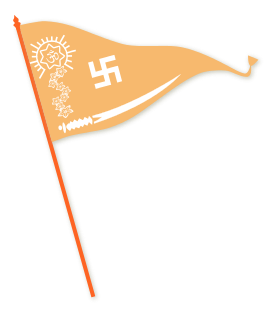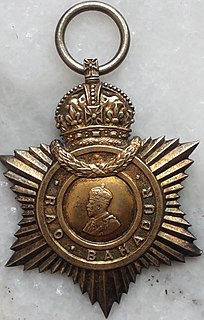
Syama Prasad Mukherjee was an Indian politician, barrister and academician, who served as the Minister for Industry and Supply in Jawaharlal Nehru's cabinet. After falling out with Nehru, protesting against the Liaquat-Nehru Pact, Mukherjee resigned from Nehru's cabinet. With the help of the Rashtriya Swayamsevak Sangh, he founded the Bharatiya Jana Sangh, the predecessor to the Bharatiya Janata Party, in 1951.

The Hindu Mahasabha is a political party in India.

Satyendra Prasanna Sinha, 1st Baron Sinha, KCSI, PC, KC, was a prominent Indian lawyer and statesman. He was the first Governor of Bihar and Orissa, first Indian Advocate-General of Bengal, first Indian to become a member of the Viceroy's Executive Council and the first Indian to become a member of the British ministry. He is sometimes also referred as Satyendra Prasanno Sinha or Satyendra Prasad Sinha.

The Bengal Presidency, officially the Presidency of Fort William and later Bengal Province, was a subdivision of the British Empire in India. At the height of its territorial jurisdiction, it covered large parts of what is now South Asia and Southeast Asia. Bengal proper covered the ethno-linguistic region of Bengal. Calcutta, the city which grew around Fort William, was the capital of the Bengal Presidency. For many years, the Governor of Bengal was concurrently the Viceroy of India and Calcutta was the de facto capital of India until 1911.
The Lucknow Pact was an agreement reached between the Indian National Congress and the Muslim League (AIML) at a joint session of both the parties held in Lucknow in December 1916. Through the pact, the two parties agreed to allow representation to religious minorities in the provincial legislatures. The Muslim League leaders agreed to join the Congress movement demanding Indian autonomy. Scholars cite this as an example of a consociational practice in Indian politics. Bal Gangadhar Tilak represented the Congress while framing the deal, and Muhammad Ali Jinnah and Naman Gupta also participated in this event.

Abul Kasem Fazlul Huq, popularly known as Sher-e-Bangla, was a British Indian and Pakistani lawyer, writer and statesman from eastern Bengal. His political achievements included being the first and longest serving Prime Minister of Bengal, presenting the Lahore Resolution and leading the United Front to win the 1954 East Bengali election. In Pakistan, he is remembered as one of the country's founding statesmen. In Bangladesh, he is revered as one of the most important Bengali statesmen of the 20th century. According to Indian historian and Mahatma Gandhi's grandson Rajmohan Gandhi, "He who in 1943 had wanted to see Nazimuddin and Suhrawardy bite the dust now shares the same stretch of earth with them. All three are buried, side by side, in the grounds of the Dhaka High Court. For a while, the two of them were called Prime Minister of Pakistan. Fazlul Huq was not. But only he was spoken of as the Royal Bengal Tiger".

Lala Lajpat Rai was an Indian author, freedom fighter, and politician. He played a pivotal role in the Indian Independence movement. He was popularly known as Punjab Kesari. He was one of the three members of the Lal Bal Pal triumvirate. He was also associated with activities of Punjab National Bank and Lakshmi Insurance Company in their early stages in 1894. He died a few weeks after sustaining severe injuries during a baton charge by police when he led a peaceful protest march against the all-British Simon Commission, a commission constituted by the United Kingdom for Indian constitutional reform.

Rai Bahadur, abbreviatedR.B., was a title of honour bestowed during British rule in India to individuals for faithful service or acts of public welfare to the Empire. From 1911, the title was accompanied by a medal called a Title Badge. Translated, Rao means "prince", and Bahadur means "brave" or "most honourable". Bestowed mainly on Hindus, the equivalent title for Muslim and Parsi subjects was Khan Bahadur. For Sikhs it was Sardar Bahadur.
Balakrishna Shivram Moonje was a leader of the Hindu Mahasabha in India.

The Imperial Legislative Council was a legislature for British India from 1861 to 1947. It succeeded the Council of the Governor-General of India, and was succeeded by the Constituent Assembly of India and after 1950, was succeeded by Parliament of India.
Bhumihars, also called Babhan, are a Hindu caste mainly found in Bihar, the Purvanchal region of Uttar Pradesh, Jharkhand, the Bundelkhand region of Madhya Pradesh, and Nepal.
Sir Selwyn Howe Fremantle was a British administrator in India.

The Central Legislative Assembly was the lower house of the Imperial Legislative Council, the legislature of British India. It was created by the Government of India Act 1919, implementing the Montagu–Chelmsford Reforms. It was also sometimes called the Indian Legislative Assembly and the Imperial Legislative Assembly. The Council of State was the upper house of the legislature for India.

The United Provinces of British India, more commonly known as the United Provinces, was a province of British India, which came into existence on 3 January 1921 as a result of the renaming of the United Provinces of Agra and Oudh. It corresponded approximately to the combined regions of the present-day Indian states of Uttar Pradesh and Uttarakhand. It ceased to exist on 1 April 1937 when it was renamed as the United Provinces. Lucknow became its capital some time after 1921. Nainital is the summer capital of the province.

General elections were held in British India in 1920 to elect members to the Imperial Legislative Council and the Provincial Councils. They were the first elections in the country's modern history.

General elections were held in British India in November 1923 for both the Central Legislative Assembly and Provincial Assemblies. The Central Legislative Assembly had 145 seats, of which 105 were elected by the public.

General elections were held in British India between 28 October and late November 1926 to elect members of the Imperial Legislative Council and the Provincial Legislative Councils.
Maharaja Sir Mohammad Ali Mohammad Khan, Khan Bahadur, KCSI, KCIE was the Raja of Mahmudabad from 28 June 1903 to 23 March 1931 and a noted politician, zamindar of British India.
Nawab Sir Muhammad Muzammilullah Khan Sherwani, Khan Bahadur (1865–1935) was a noted zamindar and politician from the United Province of British India.
Following the final collapse of the Mughal Empire in 1857 and the proclamation of the British Indian Empire, the British continued to maintain and recognise many of the old Mughal and Hindu styles and titles, introducing a compound honours system which awarded those titles along with British noble and aristocratic titles and knighthoods. Uniquely amongst the countries under British dominion, India was the sole country where British hereditary titles were conferred upon British subjects not of European ancestry. All British titles and honours became obsolete after the formation of the modern Republic of India in 1950, though they continue to be recognised by the British government.











